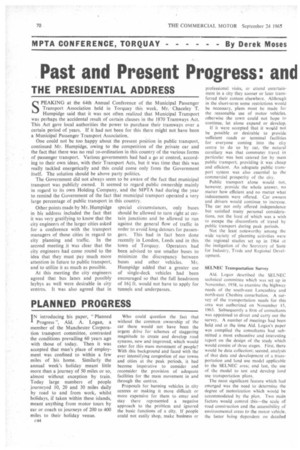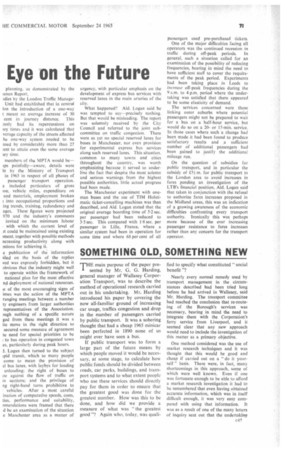MPTA CONFERENCE, TORQUAY By Derek Moses
Page 72

Page 73

If you've noticed an error in this article please click here to report it so we can fix it.
Past and Present Progress: and Eye on the Future
THE PRESIDENTIAL ADDRESS
SPEAKING at the 64th Annual Conference of the Municipal Passenger Transport Association held in Torquay this week, Mr. Chaceley T. Humpidge said that it was not often realized that Municipal Transport was perhaps the accidental result of certain clauses in the 1870 Tramways Act. This Act gave local authorities the power to purchase their tramways over a certain period of years. If it had not been for this there might not have been a Municipal Passenger Transport Association.
One could not be too happy about the present position in public transport, continued Mr. Humpidge, owing to the competition of the private car and the fact that there was no real co-ordination in this country of the various forms of passenger transport. Various governments had had a go at control, according to their own ideas, with their Transport Acts, but it was time that this was really tackled energetically and this could come only from the Government itself. The solution should be above party politics.
The Government did not always seem to be aware of the fact that municipal transport was publicly owned. It seemed to regard public ownership mainly in regard to its own Holding Company, and the MPTA had during the year to remind the Government of the fact that municipal transport operated a very large percentage of public transport in this country.
Other points made by Mr. Humpidge in his address included the fact that it was very gratifying to know that the city engineers of the larger cities asked for a conference with the transport managers of those cities in regard to city planning and traffic. In the second meeting it was clear that the city engineers had come round to the idea that they must pay much more attention in future to public transport, and to utilize it as much as possible.
At this meeting the city engineers agreed that bus lanes and possibly laybys as well were desirable in city centres. It was also agreed that in special circumstances, only buses should be allowed to turn right at certain junctions and be allowed to run against the general flow of traffic in order to avoid long detours for passengers. This had in fact been done recently in London, Leeds and in this town of Torquay. Operators had been advised to use smaller buses to minimize the discrepancy between buses and other vehicles. Mr. Humpidge added that a greater use of single-deck vehicles had been encouraged so that the full headroom of 16f ft. would not have to apply for tunnels and underpasses.
























































































































